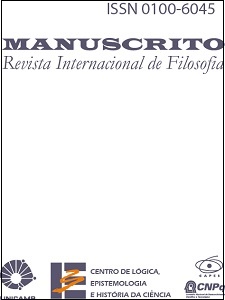Resumo
Contemporary philosophers have overall studied intentional actions that agents attempt to perform in the world. However, logicians of action have tended to neglect the intentionality proper to human action. I will present here the basic principles and laws of a logic of action where intentional actions are primary as in contemporary philosophy of action. In my view, any action that an agent performs unintentionally could in principle have been attempted. Moreover any unintentional action of an agent is an effect of intentional actions of that agent. So my logic of action contains a theory of attempts. As Belnap pointed out, action, branching time and historic modalities are logically related. There is the liberty of voluntary action. I will then work out a logic of action that is compatible with indeterminism. In classical philosophical logic, propositions with the same truth-conditions are identified. However it is clear that strictly equivalent propositions are not the contents of the same attitudes of human agents. For that reason I will first present a non-classical propositional logic capable of distinguishing the contents of intentional actions which are different. Next I will enrich earlier logics of action so as to characterize adequately intentional actions, attempts and purposes of agents and the different kinds of generation of action. I will state the basic laws of agentive commitment and action generation.
Referências
Belnap, N. (1991). Backwards and Towards in the Modal Logic of Agency, Philosophy and Phenomenological Research, vol. 51.
Belnap, N. & Perloff, M. (1990). Seeing to it: a Canonical Form for Agentives. In: Kyburg H.E. et al. (eds.) Knowledge Representation and Defeasible Reasoning, Kluwer.
Belnap, N. & Perloff, M. (1992). The Way of the Agent, Studia Logica, vol. 51.
Belnap, N., Perloff, M. & Ming Xu (2001). Facing the Future Agents and Choices in Our Indeterminist World (Oxford University Press).
Carnap, R. (1956). Meaning and Necessity (University of Chicago Press).
Bratman, M. (1987). Intentions, Plans and Practical Reason (Harvard University Press).
Chellas, B.F. (1992). Time and Modality in the Logic of Agency, Studia Logica, vol. 51.
Goldman, A.I. (1970). A Theory of Human Action (Princeton University Press).
Horty, J.F. An Alternative stit Operator, unpublished seminar notes.
Barcan, M. (1993). Modalities (Oxford University Press).
Montague, R. (1974). Formal Philosophy (Yale University Press).
Nowak, M. & Vanderveken, D. (1996). The Minimal Logic of Propositional Contents of Thought: a Completeness Theorem, Studia Logica, 54, pp. 391-410.
Prior, A.N. (1967). Past, Present, Future (Oxford, Clarendon Press).
Searle, J.R. (1983). Intentionality (Cambridge University Press).
Searle, J.R. & Vanderveken, D. (1985). Foundations of Illocutionary Logic (Cambridge University Press).
Thomason, R. (1984). Combinations of Tense and Modality. In: D. Gabbay & F. Guenthner (eds.), Handbook of Philosophical Logic, vol. 2.
Vanderveken, D. (1990-1). Meaning and Speech Acts, Volume I: Principles of Language Use and Volume II: Formal Semantics of Success and Satisfaction (Cambridge University Press).
Vanderveken, D. (1995). A New Formulation of the Logic of Propositions”. In: M. Marion & R. Cohen (eds.) Québec Studies in the Philosophy of Science, Volume 1, Logic, Mathematics and Physics, Boston Studies in the Philosophy of Science, Kluwer, pp. 95-105.
Vanderveken, D. (1997). Quantification and the Logic of Generalized Propositions. In: C. Martinez, U. Rivas & L. Villegas (ed.) Truth in Perspective, Recent Issues on Logic, Representation and Ontology, Averbury Series in Philosophy, Ashgate.
Vanderveken, D. (1997). Formal Pragmatics of Non-Literal Meaning, in the special issue Pragmatik of Linguistische Berichte edited by E. Rolf, pp. 135-148.
Vanderveken, D. (1999). Success, Satisfaction and Truth in the Logic of Speech Acts and Formal Semantics, Cahier d’Epistémologie no 9909, Université du Québec à Montréal, 1999, reprinted in S. Davis & B. Gillan (eds), A Reader in Semantics (Oxford University Press).
Vanderveken, D. (2001). Universal Grammar and Speech Act Theory. In: D. Vanderveken & S. Kubo (eds.) Essays in Speech Act Theory, Benjamins, P&b nº 77, pp. 25-62.
Vanderveken, D (2002). L’ontologie formelle et la théorie de la vérité selon la prédication propres à la logique illocutoire. In: Jean-François Malherbe (ed.) La responsabilité de la raison Hommage à Jean Ladrière Éditions de l’Institut Supérieur de Philosophie – Éditions Peeters, Louvain-la-Neuve Louvain Paris, pp. 261-82.
Vanderveken, D (s.d). Formal Ontology and Predicative Theory of Truth, Cahiers d’Épistémologie Université du Québec à Montréal, Cahiers d’Épistémologie nº 2001-02 In: D. Vanderveken (ed.) Logic Thought & Action at Kluwer.
Vanderveken, D (s.d). Propositions, Truth and Thought A New Formulation of Philosophical Logic, In: Cahiers d’Épistémologie, Université du Québec à Montréal.
Vanderveken, D (s.d). Towards the Foundations of the Logic of Action, In: Cahiers d’Épistémologie, Université du Québec à Montréal.
Von Neumann, J. & Morgenstern, O. (1944). Theory of Games and Economic Behavior (Princeton University Press).
Zanardo, A. (1985). A Finite Axiomatization of the Set of Strongly Valid Ockamist Formulas, Journal of Philosophical Logic, 1985.

Este trabalho está licenciado sob uma licença Creative Commons Attribution 4.0 International License.
Copyright (c) 2002 Manuscrito: Revista Internacional de Filosofia

